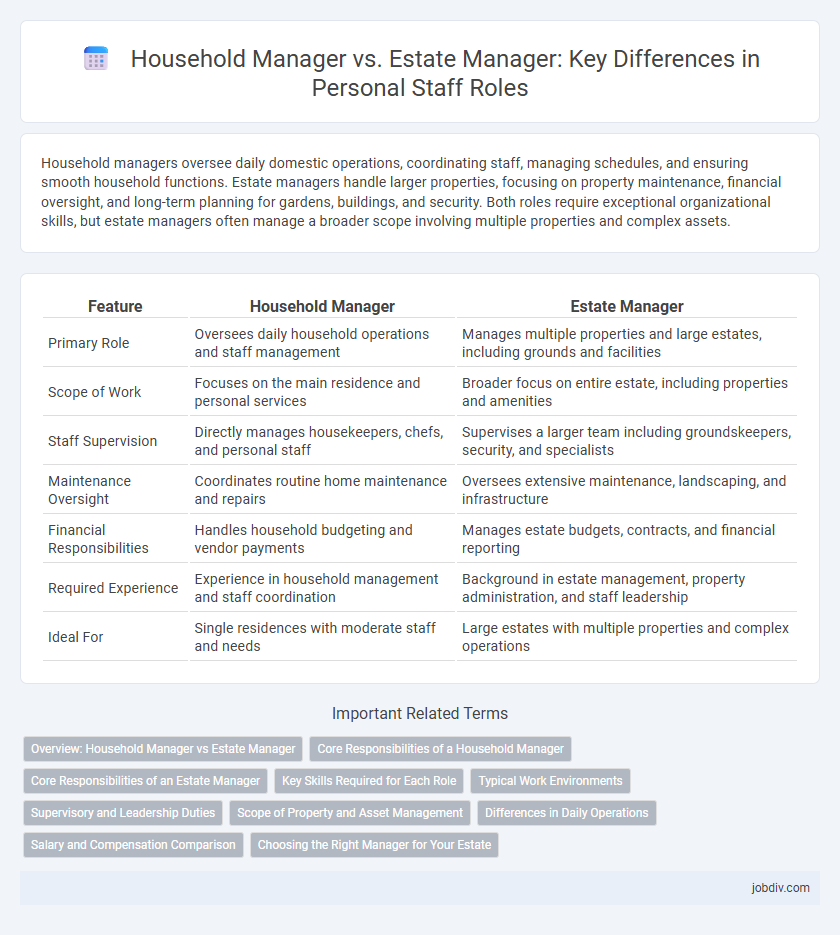Household managers oversee daily domestic operations, coordinating staff, managing schedules, and ensuring smooth household functions. Estate managers handle larger properties, focusing on property maintenance, financial oversight, and long-term planning for gardens, buildings, and security. Both roles require exceptional organizational skills, but estate managers often manage a broader scope involving multiple properties and complex assets.
Table of Comparison
| Feature | Household Manager | Estate Manager |
|---|---|---|
| Primary Role | Oversees daily household operations and staff management | Manages multiple properties and large estates, including grounds and facilities |
| Scope of Work | Focuses on the main residence and personal services | Broader focus on entire estate, including properties and amenities |
| Staff Supervision | Directly manages housekeepers, chefs, and personal staff | Supervises a larger team including groundskeepers, security, and specialists |
| Maintenance Oversight | Coordinates routine home maintenance and repairs | Oversees extensive maintenance, landscaping, and infrastructure |
| Financial Responsibilities | Handles household budgeting and vendor payments | Manages estate budgets, contracts, and financial reporting |
| Required Experience | Experience in household management and staff coordination | Background in estate management, property administration, and staff leadership |
| Ideal For | Single residences with moderate staff and needs | Large estates with multiple properties and complex operations |
Overview: Household Manager vs Estate Manager
Household managers oversee the daily operations of private residences, managing staff, scheduling maintenance, and ensuring smooth household logistics. Estate managers handle larger properties, including multiple buildings and extensive grounds, coordinating landscapers, security teams, and specialized contractors. While both roles require organizational skills, estate managers typically manage more complex assets and broader responsibilities.
Core Responsibilities of a Household Manager
A Household Manager oversees daily operations of a private residence, ensuring smooth coordination of staff, maintenance, and vendor services. Core responsibilities include managing household budgets, scheduling repairs, coordinating events, and supervising cleaning and housekeeping teams. This role emphasizes logistical organization and the seamless management of all domestic activities to uphold household efficiency and comfort.
Core Responsibilities of an Estate Manager
An Estate Manager oversees the comprehensive operation of large estates, including property maintenance, staff management, financial oversight, and vendor coordination to ensure seamless daily functionality. This role requires strategic planning for long-term property preservation, event management, and compliance with legal regulations governing the estate. Unlike a Household Manager who focuses primarily on domestic tasks, an Estate Manager handles broader responsibilities spanning multiple properties and extensive grounds.
Key Skills Required for Each Role
Household managers excel in multitasking, budgeting, and coordinating daily domestic activities to ensure smooth household operations. Estate managers require advanced skills in property maintenance, staff supervision, and financial oversight to manage large estates effectively. Both roles demand strong communication, organizational abilities, and discretion to maintain privacy and efficiency.
Typical Work Environments
Household Managers primarily work in private residences, overseeing daily domestic operations such as staff coordination, budgeting, and maintenance scheduling. Estate Managers operate on larger properties, including expansive estates or multiple property holdings, managing agricultural activities, security, and extensive facility maintenance. Both roles demand a high level of organization, but Estate Managers typically engage with broader operational scopes in more complex environments.
Supervisory and Leadership Duties
Household managers oversee daily operations, including staff scheduling, budgeting, and vendor coordination, ensuring the home runs smoothly. Estate managers have broader responsibilities, supervising multiple properties and large teams, often including security personnel, groundskeepers, and maintenance staff. Both roles require strong leadership to manage personnel effectively, but estate managers focus more on strategic planning and high-level supervision.
Scope of Property and Asset Management
Household Managers typically oversee day-to-day operations within a single residence, managing staff, maintenance schedules, and household supplies to ensure smooth functioning. Estate Managers handle multiple properties or larger estates, coordinating broader asset management including real estate portfolios, security systems, and extensive grounds maintenance. The scope of property and asset management for Estate Managers is more complex, requiring strategic planning and oversight of diverse assets beyond the primary residence.
Differences in Daily Operations
Household managers oversee daily chores such as cleaning, grocery shopping, meal preparation, and organizing home maintenance schedules to ensure smooth household functioning. Estate managers handle broader responsibilities including managing multiple properties, liaising with contractors, overseeing large staff teams, and coordinating long-term estate projects like renovations or landscaping. While a household manager typically focuses on the immediate needs of a single residence, an estate manager deals with complex operations across several locations, emphasizing strategic planning and asset management.
Salary and Compensation Comparison
Household managers typically earn between $50,000 and $85,000 annually, with compensation packages that may include benefits like health insurance and paid time off. Estate managers command higher salaries, often ranging from $80,000 to $150,000 per year, reflecting their greater responsibility for managing multiple properties and staff. Bonus structures, housing allowances, and performance incentives are more common in estate manager roles, contributing to overall higher compensation.
Choosing the Right Manager for Your Estate
Selecting the right manager for your estate depends on the scope and complexity of your household needs. Household Managers oversee daily operations, staff coordination, and routine maintenance, ideal for smaller estates with hands-on supervision. Estate Managers handle broader responsibilities, including property management, financial oversight, and strategic planning, making them suitable for larger estates requiring comprehensive management expertise.
Household Manager vs Estate Manager Infographic

 jobdiv.com
jobdiv.com